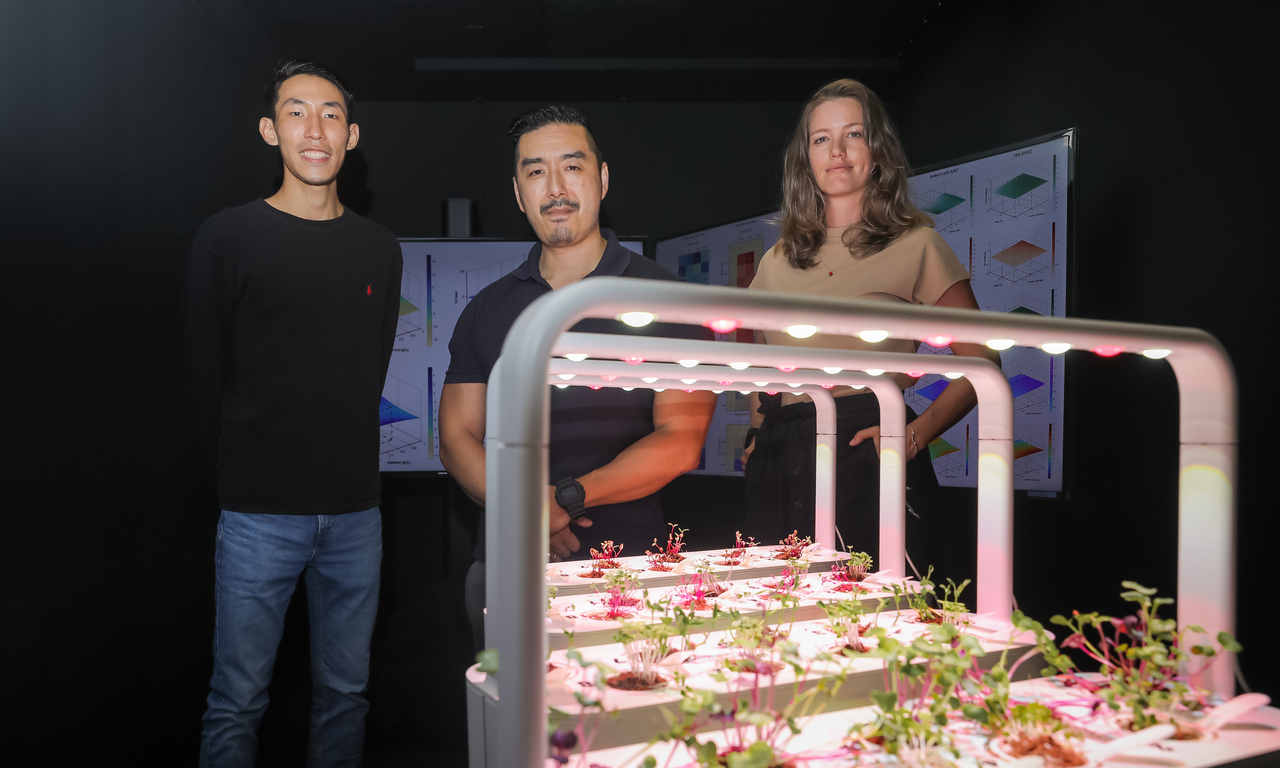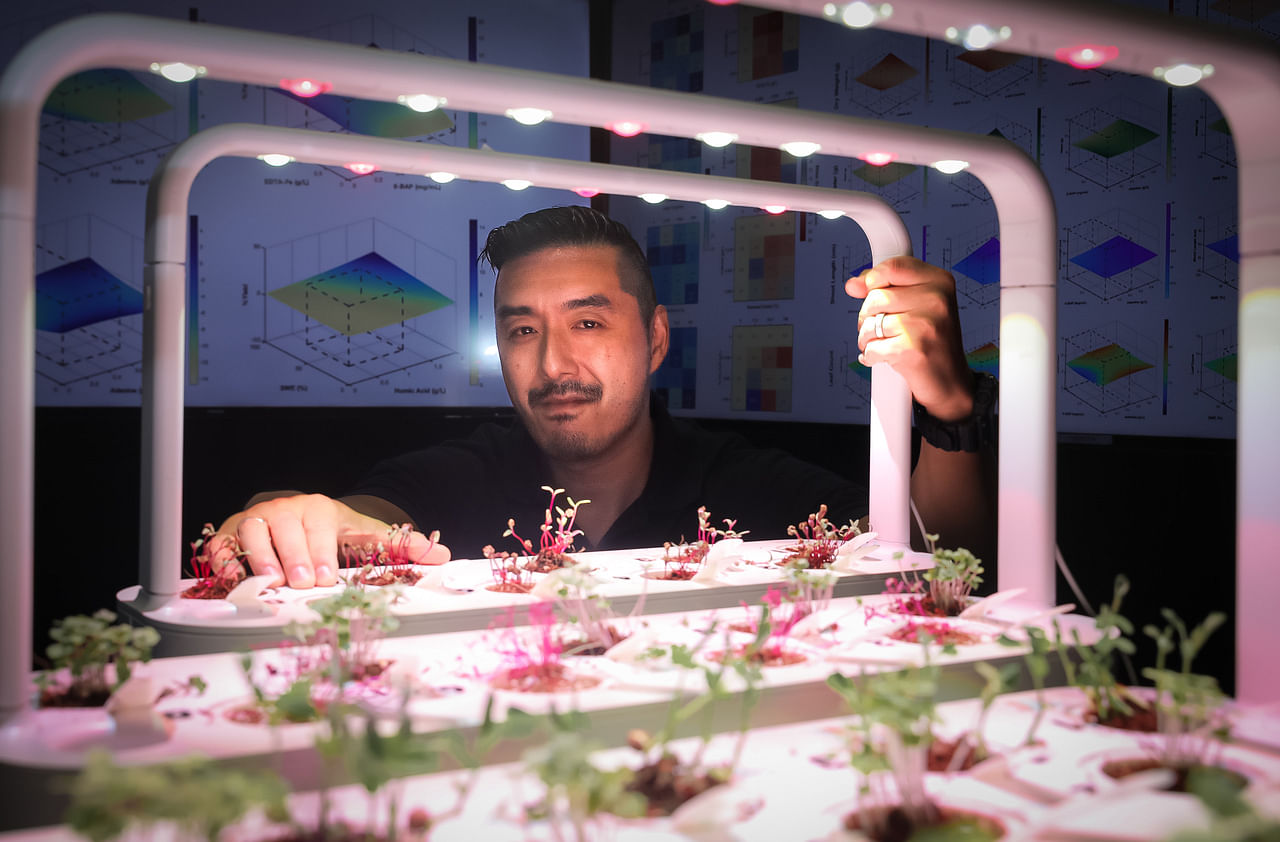Plant medicine: Using AI to optimise soil composition while increasing crop yield
Sign up now: Get ST's newsletters delivered to your inbox

(From left) Research assistant Mr Peter Wen-Yow Wang, director Professor Dean Ho and head of Digital Health Innovation Dr Agata Blasiak.
ST PHOTO: GAVIN FOO
SINGAPORE - Scientists in Singapore are looking to boost plant growth by leveraging an artificial intelligence (AI) platform that has helped to determine possible combinations and doses of drugs used to treat Covid-19.
In a study, they found that when a modified version of the platform was used to determine the best mix for soil to boost plant growth, it led to improved yield without affecting the plant's nutritional value.
Professor Dean Ho, who led the study, said: "Artificial intelligence has been widely used in indoor farming - by means of remote monitoring, as well as to control the amount of water, light and fertiliser to improve crop yield."
Added Prof Ho, director of the Institute for Digital Medicine (WisDM) at the National University of Singapore's (NUS) Yong Loo Lin School of Medicine: "But we're looking to think differently, by leveraging AI to determine the optimal ingredients for use in soil to maximise plant yield."
Such a method could potentially see fewer ingredients used, and, in turn, help urban farms improve productivity and cut costs. This could take the Republic a step forward to realising its vision of producing 30 per cent of its nutritional needs by 2030, Prof Ho said.
He modified his existing AI programme, IDentif.AI, to study how manipulating different ingredients used in peat moss can impact the yield of red spinach.
"Coming up with the perfect soil mixture for growing plants is very much like medicine. These ingredients, just like drugs, have different dose or concentration-dependent synergy, meaning that they can complement one another when used in the right concentrations, to help improve overall plant growth," said Prof Ho.
Under a new programme known as WisDM Green, Prof Ho and his team trialled combinations of eight different types of ingredients.
They found that the two most effective combinations were a dynamic duo of 6-BAP and EDTA-Fe, as well as a combination of humic acid and seaweed extract.
The synthetic plant hormone 6-BAP is known to help plant cells divide to grow shoots and leaves, while the chemical compound EDTA-Fe, helps to supply iron to the plants - which is important for them to function.
Humic acid, on the other hand, improves nutrient uptake of the plant, while seaweed extract helps to promote healthy growth and strong roots.
The first author of the study, Mr Peter Wang, a research assistant at the N.1 Institute for Health at NUS, said different concentrations of ingredients used for both combinations have helped to increase plant yield by between 15 per cent and 35 per cent.
The research paper was published on May 27 in the peer-reviewed journal Advanced Intelligent Systems.
Prof Ho said urban farmers usually rely on fertiliser-driven yield and may also have their in-house formulations that they use to improve plant growth.
"However, if we can help urban farmers optimise these formulations and understand how different combinations interact, we can help them in prioritising or deprioritising combinations or the use of certain ingredients.
"This may help them to improve yield, and save costs by reducing the usage of certain ingredients," he added.
For example, the AI system found that adding ingredients, such as humic acid and adenine (a plant growth regulator) to the 6-BAP and EDTA-Fe combination resulted in negative yield.

NUS N.1 Institute for Health director Professor Dean Ho’s AI system, IDentif.AI which is able to determine the most accurate drug doses combination of drugs for treating diseases like Covid-19. He has since expanded his programme to look at plant growth - being able to get the maximum yield and nutrition with the most optimal combination of ingredients, 26 May 2022.
PHOTO: ST
The team is now testing the ingredient combinations on a selection of different plants, such as arugula and bok choy, to further validate their results.
"What we hope to do is to create a community garden, in say, a housing estate, where volunteers can try out different soil mixtures with varying concentrations of ingredients.
"Each volunteer would therefore serve as a data point for our study, to help us validate the most optimal ingredient combination, in real-world settings," said Prof Ho.
At the same time, the team is also developing an AI imaging technology to create a diagnostic tool where farmers could one day take photos or videos of their plants to determine if certain crops will have a strong yield.
The parameters include plant height, shoot length and stem thickness.
"These could serve as biomarkers for a plant's potential harvest outcome - much like predictive healthcare," said Prof Ho.
He hopes to partner with urban farms here to trial these AI findings, as well as to look at how other factors, such as light and water, can be optimised to improve plant yield.
"A big focus of WisDM Green is on sustainability and minimising our carbon footprint. One way of doing so would be to look at whether it is possible to use less water, and lower light intensity, while achieving the same yield and nutritional outcome," said Prof Ho.
Mr Bjorn Low, executive director and co-founder of urban farm Edible Garden City, said that in broad strokes, any research to reduce costs and increase yields is beneficial.
But the bulk of the costs come from overheads such as rental and high energy input costs, like cooling.
This is because the lights used for indoor growing can emit heat in an enclosed space despite being energy-efficient.
"For urban farms, which are limited by space, such improvements to crop yield may not have a significant impact on overall business.
"But for a large commercial outdoor farm, these improvements may be more impactful," Mr Low said.


